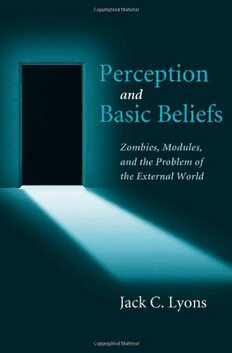Download Perception and Basic Beliefs: Zombies, Modules and the Problem of the External World PDF Free - Full Version
Download Perception and Basic Beliefs: Zombies, Modules and the Problem of the External World by Jack C. Lyons in PDF format completely FREE. No registration required, no payment needed. Get instant access to this valuable resource on PDFdrive.to!
About Perception and Basic Beliefs: Zombies, Modules and the Problem of the External World
Perception is our main source of epistemic access to the outside world. Perception and Basic Beliefs addresses two central questions in epistemology: which beliefs are epistemologically basic (i.e., noninferentially justified) and where does perception end and inferential cognition begin. Jack Lyons offers a highly externalist theory, arguing that what makes a belief a basic belief or a perceptual belief is determined by the nature of the cognitive system, or module, that produced the beliefs. On this view, the sensory experiences that typically accompany perceptual beliefs play no indispensable role in the justification of these beliefs, and one can have perceptual beliefs--justified perceptual beliefs--even in the absence of any sensory experiences whatsoever. Lyons develops a general theory of basic beliefs and argues that perceptual beliefs are a species of basic beliefs. This results from the fact that perceptual modules are a special type of basic belief-producing modules. Importantly, some beliefs are not the outputs of this class of cognitive module; these beliefs are therefore non-basic, thus requiring inferential support from other beliefs for their justification. This last point is used to defend a reliabilist epistemology against an important class of traditional objections (where the agent uses a reliable process that she doesn't know to be reliable).Perception and Basic Beliefs brings together an important treatment of these major epistemological topics and provides a positive solution to the traditional problem of the external world.
Detailed Information
| Author: | Jack C. Lyons |
|---|---|
| Publication Year: | 2009 |
| ISBN: | 9780195373578 |
| Pages: | 217 |
| Language: | English |
| File Size: | 0.612 |
| Format: | |
| Price: | FREE |
Safe & Secure Download - No registration required
Why Choose PDFdrive for Your Free Perception and Basic Beliefs: Zombies, Modules and the Problem of the External World Download?
- 100% Free: No hidden fees or subscriptions required for one book every day.
- No Registration: Immediate access is available without creating accounts for one book every day.
- Safe and Secure: Clean downloads without malware or viruses
- Multiple Formats: PDF, MOBI, Mpub,... optimized for all devices
- Educational Resource: Supporting knowledge sharing and learning
Frequently Asked Questions
Is it really free to download Perception and Basic Beliefs: Zombies, Modules and the Problem of the External World PDF?
Yes, on https://PDFdrive.to you can download Perception and Basic Beliefs: Zombies, Modules and the Problem of the External World by Jack C. Lyons completely free. We don't require any payment, subscription, or registration to access this PDF file. For 3 books every day.
How can I read Perception and Basic Beliefs: Zombies, Modules and the Problem of the External World on my mobile device?
After downloading Perception and Basic Beliefs: Zombies, Modules and the Problem of the External World PDF, you can open it with any PDF reader app on your phone or tablet. We recommend using Adobe Acrobat Reader, Apple Books, or Google Play Books for the best reading experience.
Is this the full version of Perception and Basic Beliefs: Zombies, Modules and the Problem of the External World?
Yes, this is the complete PDF version of Perception and Basic Beliefs: Zombies, Modules and the Problem of the External World by Jack C. Lyons. You will be able to read the entire content as in the printed version without missing any pages.
Is it legal to download Perception and Basic Beliefs: Zombies, Modules and the Problem of the External World PDF for free?
https://PDFdrive.to provides links to free educational resources available online. We do not store any files on our servers. Please be aware of copyright laws in your country before downloading.
The materials shared are intended for research, educational, and personal use in accordance with fair use principles.

